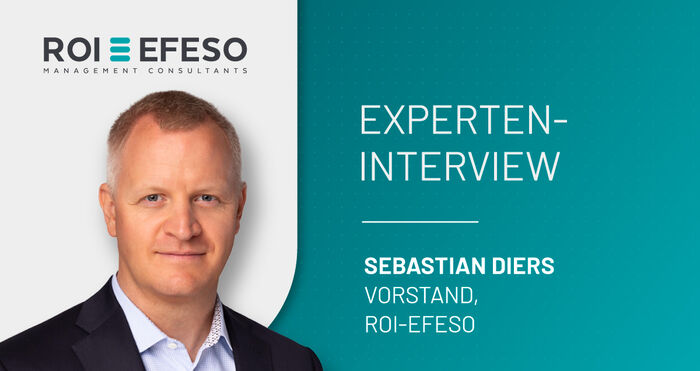"The Zero Loss principle takes on a different scale."
Experte: Sebastian Diers, Managing Director, EFESO DACH | 11/30/2023 | Teilen auf in

At the European Manufacturing Summit (EMS) in Berlin on November 27 and 28, industry decision-makers discussed how to make their value networks resilient and future-proof. Solutions were exchanged with operations managers from market-leading companies in a panel discussion moderated by EFESO. Here, the participants discussed how the maturity level of operational excellence (OPEX) can be further developed, what role digitalization plays here and to what extent this opens up opportunities in the development of a Future Factory.
Mr. Diers, the most important industry topics were bundled at EMS: From plant and process design to innovation management and sustainability through to HR aspects. This shows how complex and difficult to calculate the range of economic challenges currently is. Why should companies focus on OPEX as one of the core topics for implementing their strategies right now?
SD: First of all, to activate the experience and effectiveness of the entire organization in a consistent and targeted manner, to integrate new technologies into work processes and to be able to react quickly to changes in the market environment. OPEX is inherently designed for flexibility and adaptability in business processes as well as for the dovetailing of top-down and bottom-up perspectives.
Those who anchor OPEX principles in the company can not only solve complex challenges across all functions, management levels and cultures at short notice. They can also efficiently deal with prioritized tactical and strategic issues. In addition, programs for the continuous development of the OPEX maturity level are not only aimed at structural and process improvements. They also integrate future-proof technologies and take into account needs-based leadership development.
All in all, OPEX enables companies to achieve their strategic ambitions. It is essential to strengthen this core of entrepreneurial activity in a targeted manner.
Is there an OPEX approach that ideally prepares companies for future challenges?
SD: There is no "one fits all" solution, as the starting conditions and objectives in the industry are too different. However, there are elements that work across all industries:
- For example, companies should set up a process to operationalize and regularly review their strategy – as well as establish a production system that is subject to permanent further development. This includes technological, communicative, and cultural fields of action, for example with regard to shopfloor management that is permeable across all levels.
- Team leadership plays a central role. The focus here can be on creating key moments to activate and involve employees. Or embedding change management as a constant in the leadership role. In all these areas, it is important to understand digitalization as an enabler: digital use cases can lead to increased performance in processes, while analytics tools and artificial intelligence can help prevent errors and downtime. It is also worth using digital learning to empower employees in line with requirements.
Let's look into the future: what contribution will OPEX make in a Future Factory?
SD: The initial situation must be considered here. In a "brown field" approach to the factory of the future, a well-anchored, living OPEX system with a high degree of maturity forms the central basis for success. A "green field" approach can only succeed if the OPEX working method and the associated work processes are already embedded in the design and ramp-up phases.
To what extent does the way of working change? Please give us an example.
SD: In the Future Factory it will be important, among other things, to operate in value networks across factories and to react much more flexibly to market requirements than today. The Zero Loss principle will take on a completely different scale: real-time plan adjustments will have to be managed within these networks.
In addition, the use of new technologies such as artificial intelligence is significantly changing roles and responsibilities. For example, employees must be able to operate these technologies and new, modularized equipment efficiently in order to continuously increase performance.
Find out more about the EFESO Group, the official partner of the European Manufacturing Summit.
|
|
Thank you for Signing Up |


